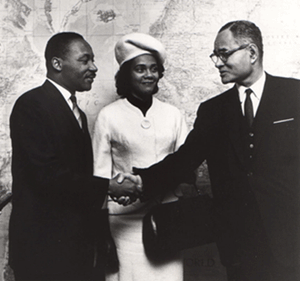|
Trailblazer and Activist
Bunche was a trailblazer in the civil rights movement. While co-director of the
Institute of Race Relations at Swarthmore College in 1936, he wrote A World View of Race. The following
year he participated in the Carnegie Corporation's survey of blacks in America , under the direction of
Swedish sociologist Gunnar Myrdal, which resulted in the publication of Myrdal's An American Dilemma:
The Negro Problem and Modern Democracy.
He was an early champion of fair labor laws, and was a colleague of A.
Philip Randolph, black union leader and activist in the 1930s, although he disagreed with the
concept of separate unions based on race, and advocated that blacks become members of integrated
unions in a wider national movement. In 1931 he organized a protest against the segregated National
Theater in Washington, D.C. where Porgy and Bess was playing, and succeeded in having the theater
integrated during the run of the play. He helped to found the National Negro Congress in 1936,
bringing together black leaders–professional and white-collar workers with manual workers, their
leaders and organizers. |
Bunche always remained true to his principles, even though it meant jeopardizing
his own professional advancement. Early in his career, when U.S. President Harry S.Truman offered him
the position of Assistant Secretary of State, Bunche declined because of the segregated housing conditions
in Washington, D.C.
While Bunche actively championed independence movements
throughout Africa, he attracted criticism from black activist leaders in the United States for
what they perceived as his neglect of the black freedom movement at home during the 1950s and
1960s. But in fact, Bunche traveled extensively throughout the U.S., including the South, using
his stature as a Nobel Prize Laureate to speak out against racial discrimination. Bunche was
awarded the Spingarn Medal by the National Association for the Advancement of Colored People
(NAACP) in 1949 and also served as a Director and Board member for 22 years. In 1959 Bunche
spoke before the Periclean Club in the City of Birmingham, Alabama, one of the most segregated
cities in the South. In his speech he recalled racial incidents from his youth and urged his
listeners to never run from a fight for principles. Ironically, though the mayor honored the
Nobel Laureate with the “key to the city”, Bunche was refused a room at Birmingham's
Dinker-Tutwiler Hotel during his stay.
|
 |
| |
Two Nobel Peace Prize winners meet at UN Headquarters |
|
In 1963, Bunche attended the funeral of Medgar Evers, the civil rights
activist who was brutally murdered in front of his family home in Jackson, Mississippi. Bunche drew the wrath of the Southern press when he remarked that Mississippi was more in need of the UN than South Africa. Bunche walked side by side with the Reverend Dr. Martin Luther King, Jr., in the civil rights march from Selma to Montgomery, Alabama in 1965, prominently carrying a UN flag while the peaceful demonstration advanced. Despite his ill health, he walked several miles on the seminal march to demand voter registration rights for blacks in the South and across America.
In spite of the sometimes sluggish progress of the civil rights movement and the inner-city violence of the 1960s in the United States, Bunche continued advocating full integration, criticizing the concept of black separatism. At the same time, Bunche reasoned, whites needed to demonstrate that “democracy is color-blind”. Bunche exerted his influence personally in speeches and publications, particularly from 1945 to 1965. His message was clear: "Racial prejudice is an unreasoned phenomenon without scientific basis in biology or anthropology; segregation and democracy are incompatible."
|
<Previous l Next>
|
|
|

